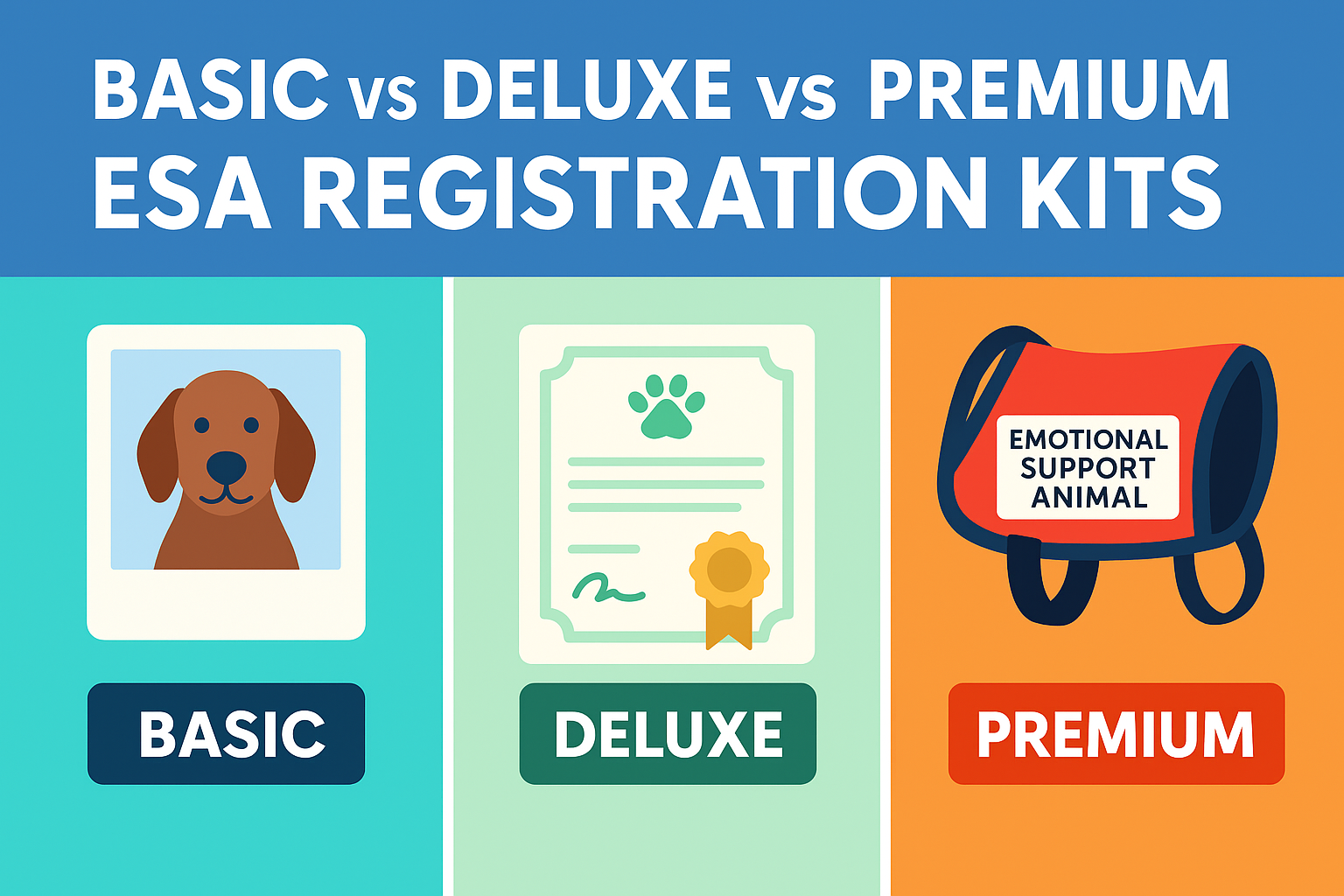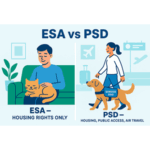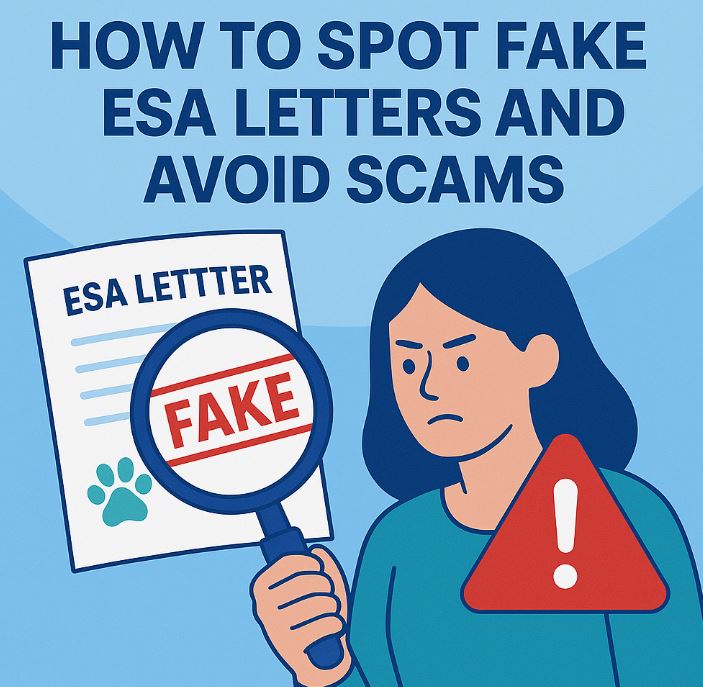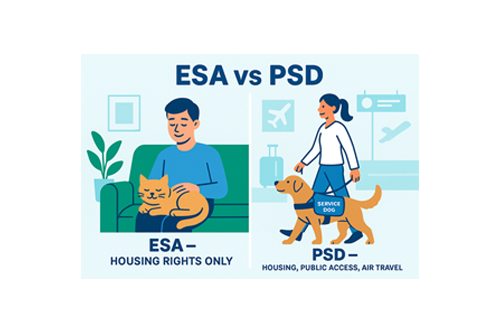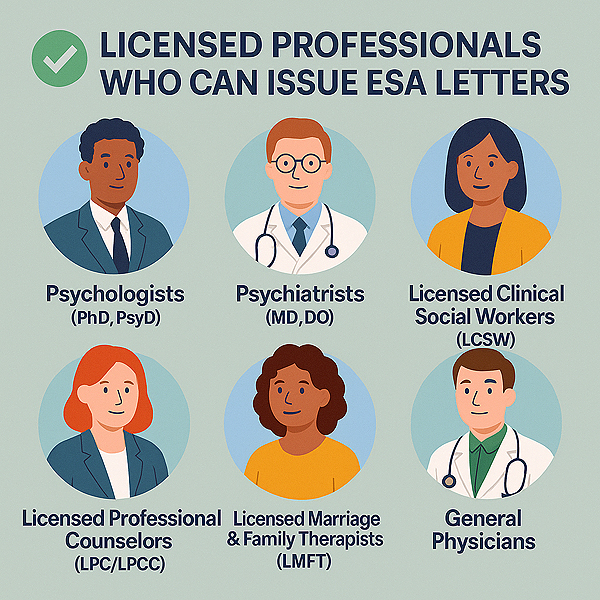Housing Rights for ESA Owners Under the FHA

Why ESA Housing Rights Matter
For millions of Americans, an Emotional Support Animal (ESA) is more than a companion—it’s a lifeline. ESAs provide comfort, reduce anxiety, and help people manage conditions like PTSD, depression, or phobias.
But when it comes to housing, ESA owners often face challenges. Many landlords advertise “no pets allowed” or charge hefty deposits and pet rent. That’s where the Fair Housing Act (FHA) steps in to protect ESA owners from discrimination.
This article breaks down your rights under the FHA, what landlords can (and cannot) do, and how to make sure your ESA request is approved smoothly.
What Is the Fair Housing Act (FHA)?
The Fair Housing Act, passed in 1968, is a federal law that prohibits housing discrimination based on factors like race, religion, disability, and family status. For ESA owners, the key protection is that disability includes mental and emotional health conditions.
This means:
- If you have a qualifying condition verified by a licensed professional, and your ESA helps alleviate symptoms, your landlord must make reasonable accommodations—even if they normally prohibit pets.
In short: the FHA ensures equal housing opportunities for people who rely on ESAs.
ESA Housing Rights Under the FHA
Here’s what you’re entitled to as an ESA owner under the FHA:
✅ No-Pet Policies Don’t Apply
Landlords with blanket “no pets” rules must allow your ESA once you provide a valid ESA letter.
✅ No Pet Fees, Deposits, or Rent
While landlords can charge tenants for actual damage, they cannot charge pet deposits, monthly pet rent, or additional fees for ESAs.
✅ ESAs Are Not “Pets”
Legally, ESAs are considered a reasonable accommodation for a disability, not pets.
✅ All Types of Housing Are Covered
The FHA applies to most housing types: apartments, condos, rental homes, college dorms, and co-ops.
Landlord Limitations Under the FHA
While landlords must accommodate ESAs, they do have rights too. They can deny a request if:
- ❌ The ESA poses a direct threat to others (e.g., aggressive behavior).
- ❌ The ESA would cause significant property damage.
- ❌ The tenant doesn’t provide a valid ESA letter from a licensed provider.
- ❌ The accommodation would create an undue financial or administrative burden (rare, but possible in very small housing providers).
👉 Importantly: landlords cannot deny an ESA just because of breed, size, or weight restrictions.
What a Valid ESA Letter Must Include
A valid ESA letter is the cornerstone of your FHA protections. Without it, your animal is considered a pet.
It must include:
- Full name, license number, and state of the provider
- Statement confirming you have a mental/emotional condition and the ESA alleviates symptoms
- Date of issuance (within the last 12 months)
- Provider contact info (so landlords can verify credentials)
Pro Tip: Many landlords now verify ESA letters by looking up the provider’s license in state databases. That’s why working with a trusted source like NSAR is essential.

How to Submit an ESA Housing Request
Follow these steps to ensure smooth approval:
- Get your ESA letter → Secure it from a licensed professional.
- Write a simple request → Example: “I am requesting reasonable accommodation for my Emotional Support Animal under the Fair Housing Act. Attached is my ESA letter.”
- Submit early → Don’t wait until move-in day—send your letter with your application.
- Keep a copy → Save your email or physical letter for future proof.
- Stay professional → Respond politely if landlords ask for verification.
👉 With NSAR, you’ll get a letter that meets all requirements—and can be easily verified by landlords.
What Landlords Can and Cannot Ask
Landlords are allowed to:
- Verify the provider’s license
- Confirm the ESA letter is current
They cannot:
- Ask about your diagnosis or condition
- Demand your medical records
- Require “registration” as a substitute for a letter (though many appreciate NSAR’s registration kits for clarity)
ESA Housing Rights in College Dorms
Yes—college dorms are covered by the FHA. Schools must provide reasonable accommodation for students with ESAs, just like landlords.
Challenges students face:
- Schools often request multiple documents.
- Dorm staff may not understand ESA rules.
- Timing is critical—request early to avoid move-in delays.
Pro Tip for students: Pair your ESA letter with an NSAR registration kit (ID card + certificate). This makes approvals smoother and avoids back-and-forth.
Common ESA Housing Misconceptions
“My landlord says ESAs aren’t allowed in luxury apartments.”
❌ Wrong. FHA protections apply across all housing types.
“I have to pay a pet deposit for my ESA.”
❌ Wrong. Fees are only allowed if your ESA causes actual damage.
“I need to register my ESA by law.”
❌ Wrong. Registration isn’t required, but NSAR kits help streamline interactions.
“My landlord can deny my ESA because of its breed.”
❌ Wrong. Breed/weight restrictions don’t apply to ESAs under the FHA.
Case Examples
Case 1: Sarah’s Apartment Denial
Sarah’s landlord initially refused her ESA because of a “no pets” rule. After she submitted a valid ESA letter, the landlord approved her dog without charging fees.
Case 2: James in Student Housing
James requested an ESA in his college dorm. Staff pushed back, asking for medical records. With his ESA letter and NSAR registration certificate, he clarified his rights and was approved within a week.
Case 3: Carlos and Breed Restrictions
Carlos’s landlord said pit bulls weren’t allowed. Under the FHA, breed restrictions don’t apply to ESAs. Once Carlos provided his ESA letter, his dog was accepted.
State Laws vs Federal FHA
While the FHA is federal law, some states add extra protections or requirements. For example:
- California → Providers must have a 30-day relationship with the tenant before issuing ESA letters.
- Florida → Fines for tenants who submit fraudulent ESA letters.
Always check your state’s laws—but remember: federal FHA protections always apply.
FAQs About ESA Housing Rights
Can my landlord deny my ESA?
Only if your ESA poses a threat, causes damage, or you don’t provide a valid letter.
Do ESA letters expire?
Yes—most landlords require letters dated within the last 12 months.
Can I have more than one ESA?
Yes, if your provider determines more than one animal is necessary.
Do ESAs have public access rights?
No—housing protections only. Public access rights apply to service dogs, not ESAs.
The Bottom Line
The Fair Housing Act protects ESA owners from discrimination in housing. With a valid ESA letter, you can live with your support animal—free from pet fees, breed restrictions, or “no pets” rules.
But the key is having legitimate documentation from a licensed provider. That’s where NSAR helps:
- 📝 Licensed professionals who issue valid ESA letters
- Optional registration kits for smoother interactions
- ✅ Trusted by thousands of ESA owners across the U.S.
👉 Don’t risk rejection. Start your ESA letter evaluation today with NSAR and secure your housing rights with confidence.

